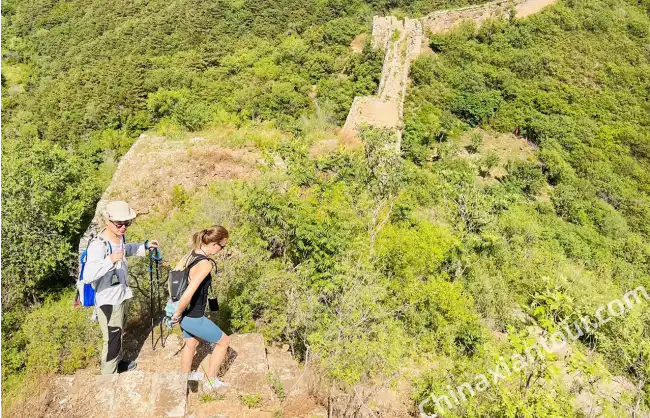The Great Wall of China is a testament to the ancient wisdom of Chinese people, stretching over 13,000 miles. Seeing it in person is even more amazing than reading about it in history books. It’ll leave you in awe and become your unforgettable experience. Many travel to China just to witness its magnificence.
While most visitors are content to just see this legendary site in person or hike a section of the Great Wall, a growing number of adventurers are seeking a different kind of experience, by camping on the Great Wall of China overnight.

Why Camp on the Great Wall of China
By day, the Great Wall of China is a busy tourist destination, especially well-known sections like Badaling and Mutianyu. However, at night, you’ll find yourself pretty much left on your own, with only the whispering winds and distant calls of wildlife. You can have an intimate experience with the great historical wonder and capture stunning shots without interference from crowds.
One of the things that attract campers to the Great Wall of China is the gorgeous sunset and sunrise from a vantage point like no other. As the sun sets, a golden shower of light sheds on the Great Wall. Watch the orange sun slowly edge below the horizon. At dawn, see the first light of day shine on the ancient stones like it have for thousands of years.
Where is Camping Allowed on the Great Wall of China
Can you camp on the Great Wall of China?
Popular tourist sections of the Great Wall are not allowed for camping, such as Badaling, Mutianyu, Juyongguan, Jinshanling, and Simatai. Tourist infrastructures are closed outside of certain hours and are heavily regulated. Visitors might be fined or detained if found camping on these grounds.
You might be wondering why the rules concerning camping are so strict at the Great Wall. First, there’s no toilet at the preserved historical site. Campers staying overnight might leave behind a lot of garbage, cause pollution, and damage the ancient structure.
Second, the laws are in place out of consideration for the safety of tourists. There is no light on the Great Wall of China. There might be wild animals in remote sections. It is dangerous for campers to stay overnight in these areas. Third, thunderstorms and heavy winds have been reported in some sections of the Great Wall. Campers might be left stranded and helpless overnight.
Here are some areas where you can camp on the Great Wall. But it’s important to check with local authorities or tour guides for the latest information beforehand because the rules are subject change, and some sections may require special permits.
- Jiankou Great Wall is a favorite among experienced hikers and campers because its terrain is rugged and steep. It is challenging and rewarding at the same time. During your hike, you’ll see the wild and most authentic beauty of the mountains and the ancient Great Wall.
- Gubeikou Great Wall has well-preserved original architecture of the wall. It is less crowded compared to other sections. You’ll find peace and solitude at Gubeikou.
- Huanghuacheng is the only Great Wall of China camping site with a water landscape. It is partially submerged in a reservoir. It is the most beautiful in the summer when the surrounding area is lush and green.

How to Get to the Camp Sites
Getting to the Great Wall of China campsites involves a combination of public transportation and hiking from Beijing.
- To Jiankou: Take a bus or train to Huairou, then take a taxi to Xizhazi Village, the starting point for the Jiankou section. The hike to the wall from there takes about 1-2 hours.
- To Gubeikou: Take a direct bus to Gubeikou town. Or take a train to Miyun and then a local bus or taxi to Gubeikou. The wall is only a short hike from the town.
- To Huanghuacheng: Take a bus from Beijing to Huairou, then a local taxi to Huanghuacheng section. This area is more accessible. The hike to the wall is short.
Although buses and trains are recommended for their lower prices. Taxis or hired cars can make your journey a lot easier, especially when you’re carrying camping gear.
The Great Wall of China Camping Experience
It’s a good idea to arrive in the late afternoon when most of the tourist crowds have cleared. You’ll have plenty of time to hike to your site, set up camp, and explore before nightfall. Make sure to find a flat, sheltered area in a tower for your tent. Watch your footing while setting up.
As it gets later in the day, there will be hardly anyone in the area. It’ll feel like you have the Great Wall to yourself. As sun sets, prepare a simple meal for yourself and enjoy the breathtaking views over the wall to yourself. At night, you’ll likely have a clear sky perfect for stargazing.
The lack of modern amenities and distractions is a precious opportunity for solitude. You’ll feel a connection to the distant past, standing where the soldiers and workers once stood to guard and build the Great Wall.

What to Know Before You Camp on the Great Wall of China
1. Permits and Regulations
Before setting out, make sure camping is allowed on your chosen site. Some areas require special permits from local authorities, or you can book a tour with local operators.
Follow the rules and guidelines put in place by local authorities or operators, or you might face fines and further restrictions. If there are other campers at your site, be respectful, keep your area quiet and clean.
2. Navigation and Safety
Make sure you have a reliable map, GPS device, or guide to navigate the area. Signal and connection may be shaky in the mountain. It might be a good idea to tell someone about your plans. Put safety first! Avoid camping alone and be careful of steep drops and loose stones.
3. Conditions and What to Expect
There is no light on the Great Wall. You won’t be able to see much after night falls while you camp on the Great Wall. If you want to see a night view on the wall, visit the Simatai Great Wall, which is the only section open and lit up at night.
There’s also no shop on the wall, nor is making fire allowed. So bring enough water with you, along with ready-made food to last through the night. Or you can eat in the nearby towns.
4. Weather
Before you plan on camping on the Great Wall of China, check the mountain weather forecast before you set out! Avoid the rainy season in July and August when there are frequent thunderstorms. Bad weather can make the hike more treacherous. The temperature drops significantly at night. Even in the summer, the temperature at night is only about 59°F (15°C). You might also experience strong winds at an altitude, so set up your tent in a tower with shelter.
5. Leave No Trace
There are no toilets on the Great Wall. Be responsible for your camping site. Take all your trash with you and avoid damaging the wall or environment.
What to Bring
- Camping Gear: a tent, a sleeping bag, a sleeping mat
- Clothing: wear layered clothing, a warm wind-proof, rain-proof jacket, hiking boots
- Food and Water: enough supplies for a night (there is no shop on the Great Wall), ready-made meals, a portable stove if needed
- Navigation: a map, a GPS device with connection
- Other Essentials: trash bags, trekking poles if needed, flashlight, a power bank, mosquito repellent, first aid kit
The Great Wall of China Camping Cost
To camp on the Great Wall, you need to pay for transportation, permits if required, gear, and a local tour group if you book for one.
- Transportation:$3-15 (CNY 20-100) for one-way public transportation to Jiankou, Gubeikou, or Huanghuacheng; $45-90 (CNY 300-600) for taxis or private cars
- Permits:$7-30 (CNY 50-200) if required
- Camping Gear:$30-60 (CNY 200-400) for rental in Beijing
- Tour Group: generally $499 for a solo traveler, $289 each for two, $269 for three, $249 for four, $229 for five, $199 for six or more (for reference only)
Popular Great Wall of China Hiking and Camping Tours









